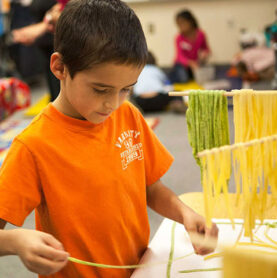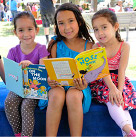Every child has their own unique needs and for some, a larger child care center may not be the right environment for them. Family Child Care Homes may be an alternative for families seeking a smaller, more home-like environment. They offer the same level of safety, care, and adherence to licensing regulations as center based programs.
Why choose a FCCH?
A Family Child Care Home (FCCH) is a care setting within the provider’s home. These providers are referred to as FCCs and they are licensed facilities. Here are some of the reasons families may choose an FCC:
- Cultural connection
- Extended hours — some offer nights and weekends
- Smaller group sizes
- Mixed ages, allowing for siblings to stay together
“One thing that families like about FCCH is that it’s not as big of a transition to enter a child care home compared to a large facility, so the child may be more comfortable,” said CCRC EHS CCP Manager Jacqueline Corrales.
Like center-based care, FCCHs are held to a standard of licensing that includes care setting visits and assessments. A large license FCCH may have a capacity of up to 14 children, while a small license can care for up to eight children. “There are opportunities for parent conferences with the provider, where parents get to hear about their child’s strengths and areas in need of support,” said Corrales. “They also receive activities to do with their child at home.”
Visit the website to apply: https://www.ccrcca.org/apply/
Becoming a FCCH
With CCRC’s support, a FCCH provider receives one-on-one coaching from an early care and learning professional. The coach builds a relationship with the provider and creates SMART goals that focus on the environment and curriculum. They walk the provider through assessments that are completed for children to meet milestones and be kindergarten ready. “We’re walking through it with providers, and coaches work directly with them to assess the child,” said Corrales.
This support includes writing objective observations, completing an assessment of their environment through the Family Child Care Environment Rating Scale, developing individualized lesson plans and activities, and working with providers on challenges to help them reach the next level of care. “We ensure they turn off the TV and utilize their environment as a second teacher, because the environment is very important for children to explore and learn,” said Corrales.
Coaches visit once a month and providers collect ongoing observations through the year to assess children twice a year. Whether it’s the resources the coach is bringing in or the observation and feedback they offer, providers are constantly building on their skills. If providers request additional support, CCRC is available. “FCCH providers must have a 100 percent commitment to providing quality care for children,” said Corrales. “We want to see them succeed and see that the quality is there for the children.”
To learn more about becoming a FCCH please contact at Migdalia Bourdett [email protected] or Wendy Cartagena [email protected]


